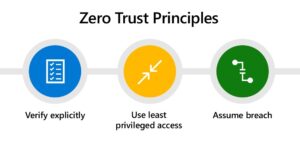The 10 Biggest Cyber Security Trends in 2024 For Which Everyone Should Be Ready From Today.

The 10 Biggest Cyber Security Trends in 2024 For Which Everyone Should Be Ready From Today.
By the completion of the coming year, the financial impact of cyber attacks on the global economy is anticipated to reach $10.5 trillion.
The considerable quantity mentioned above underscores the increasing importance of regarding cyber security as a strategic imperative at the individual, organizational, and governmental levels.
Similar to other domains of economic and scientific pursuits, the realm of artificial intelligence (AI) is poised to exert a profound influence on both offensive and defensive strategies. The ramifications of its influence will be experienced throughout each of the trends discussed in this analysis.
In recent years, there has been a notable increase in the rate of technical progress across various domains, and the realm of cyber dangers is not exempt from this trend. As they say, forewarned is forearmed – so read on to find out what my predictions are for the cyber security developments everybody should be on high alert for as we move into 2024.
1. The Cyber Security Skills Crunch

The persistent issue of a dearth of personnel possessing the requisite expertise to safeguard enterprises from cyber threats remains a prevalent concern in the year 2024. Indeed, the current state of affairs seems to be worse. According to research findings, a majority (54 percent) of experts in the field of cyber security hold the belief that the detrimental effects of the skills shortage on their respective organizations have intensified during the last two years.
Efforts to address this scenario are anticipated to encompass ongoing salary increments for those possessing the requisite expertise, alongside augmented investments in programs focused on training, development, and upskilling.
2. Generative AI Adopted On Both Sides Of The Battle

As artificial intelligence (AI) advances at an accelerated pace, there is a growing concern regarding the proliferation of increasingly complex and intelligent AI-driven assaults. The spectrum of threats encompasses deepfake social engineering endeavors as well as automated malware that exhibits intelligent behavior to circumvent detection.
Simultaneously, this technology will aid in the identification, avoidance, or mitigation of potential risks through the utilization of real-time anomaly detection, intelligent authentication, and automated incident response mechanisms. In the context of cyber assault and defense in 2024, artificial intelligence (AI) assumes a pivotal role akin to that of a queen in a game of chess. Its capacity to provide potent strategic advantages renders it a crucial asset for those who can effectively harness its capabilities.
3. Next-Level Phishing Attacks

The sophistication of social engineering assaults, which manipulate users into granting unauthorized access to systems, is expected to escalate. The utilization of generative artificial intelligence (AI) tools, exemplified as ChatGPT, facilitates the ability of a greater number of individuals to employ more sophisticated and tailored strategies in their attacks. Consequently, the prevalence of deepfake attacks is expected to rise in the future.
Moreover, the primary focus of addressing this issue will predominantly center on fostering organization-wide awareness and providing comprehensive education. However, it is worth noting that the utilization of artificial intelligence (AI) and the implementation of zero-trust principles are expected to increasingly contribute to this endeavor.
4. Cyber Security In The Board Room

In the year 2024, the field of cybersecurity has emerged as a crucial strategic concern that necessitates integration beyond the confines of the information technology (IT) department. According to a forecast by Gartner, it is anticipated that by the year 2026, around 70 percent of corporate boards will have incorporated the inclusion of at least one individual possessing specialized knowledge and proficiency in the relevant domain. This capability empowers firms to transcend a reactive defensive stance, enabling them to proactively seize new business possibilities that arise as a result of their preparedness.
5. IoT Cyber Attacks

The increased interconnectivity and internet accessibility among various devices result in a greater number of possible vulnerabilities that cybercriminals can exploit. The ongoing work-from-home phenomenon has led to a persistent concern regarding the potential risks associated with workers utilizing inadequately secured equipment for connecting and sharing data.
Frequently, the design of these devices prioritizes user-friendliness and convenience over robust security measures, rendering home consumer IoT devices vulnerable to potential risks arising from inadequate security protocols and weak passwords. The industry’s reluctance to promptly adopt IoT security standards, despite the long-standing awareness of vulnerabilities, has resulted in its persistent status as a weak point in cyber security. However, it is worth noting that this situation is gradually evolving, as elaborated more in the subsequent discussion:
6. Cyber Resilience – Beyond Cyber Security

Cyber security and cyber resilience are two phrases that are frequently employed interchangeably. Nevertheless, the differentiation will grow more significant in the year 2024 and subsequent years. The primary emphasis in the field of cyber security revolves around the prevention of attacks.
However, an increasing number of businesses are recognizing the significance of resilience, acknowledging the undeniable reality that even the most robust security measures cannot provide an absolute assurance of complete safety. Resilience measures are strategically developed to guarantee the uninterrupted continuation of activities, even in the aftermath of a successful breach. In the year 2024, prioritizing the strategic objective of enhancing the ability to swiftly recover while reducing both data loss and operational downtime would be of utmost importance.
7. Less Than Zero Trust

The core principle of zero trust, which emphasizes continuous verification, undergoes a transformation as systems grow in complexity and security becomes an integral part of business strategy. The concept of zero trust posits that the notion of a secure perimeter, within which network activity can be presumed to be free from risk, is no longer valid.
As the ever-changing threat landscape continues to grow, the aforementioned principle expands its scope beyond the confines of the business network to encompass a broader ecosystem consisting of remote workers, affiliated enterprises, and Internet of Things (IoT) devices. By 2024, the zero trust paradigm will undergo a transformation from a purely technical network security model to a more comprehensive and adaptable approach.
This shift is facilitated by the integration of continuous AI-driven real-time authentication and activity monitoring.
8. Cyber Warfare And State-Sponsored Cyber Attacks

The ongoing conflict in Ukraine, anticipated to enter its third year, has brought to light the degree to which nations are inclined and capable of employing cyber attacks on both military and civilian infrastructure in the year 2024. It is highly probable that in future military engagements occurring globally, cyber warfare operations will be closely intertwined. The prevailing strategies encompass phishing assaults, which are devised to illicitly obtain system access for the purposes of disruption and espionage, as well as distributed denial-of-service attacks, which aim to incapacitate communications, public utilities, transportation, and security infrastructure.
In addition to military conflicts, the upcoming year of 2024 will witness significant electoral events in several nations, namely the United States, the United Kingdom, and India. Consequently, it is anticipated that there will be a surge in cyber assaults with the objective of undermining the integrity of the democratic processes involved.
9. Soft Skills Becoming Increasingly Essential For Cyber Security Professionals

In the year 2024, there will be a growing expectation for cybersecurity experts to assume greater responsibilities in response to the escalating complexity of the threat landscape. This implies not only a narrow technical interpretation but also encompasses the broader social and cultural dimensions of mitigating cyber dangers, which individuals responsible for resisting such attacks will inevitably encounter. This trend will result in an increasing dependence on soft skills, including interpersonal communication, connection establishment, and problem-solving.
10. Cyber Security Regulation

There is a growing recognition among governments and businesses of the potential concerns that cyber threats offer to both national security and economic prosperity. The creation of new rules surrounding cyber security issues is significantly influenced by the possible social and political consequences associated with large-scale data breaches.
In the United Kingdom, enterprises are required to achieve compliance with the Product Security and Telecommunications Act by April 2024. This legislation establishes a set of essential security criteria that networked products must meet, such as the prohibition of default passwords upon shipment.
The implementation of the Radio Equipment Directive, which is comparable to the one adopted by the European Union (EU), has been postponed until the year 2025. However, it is anticipated that legislators will continue to prioritize discussions on this subject until the year 2024.
About The Author:
Yogesh Naager is a content marketer who specializes in the cybersecurity and B2B space. Besides writing for the News4Hackers blog, he’s also written for brands including CollegeDunia, Utsav Fashion, and NASSCOM. Naager entered the field of content in an unusual way. He began his career as an insurance sales executive, where he developed an interest in simplifying difficult concepts. He also combines this interest with a love of narrative, which makes him a good writer in the cybersecurity field. In the bottom line, he frequently writes for Craw Security.
Read More Article Here








